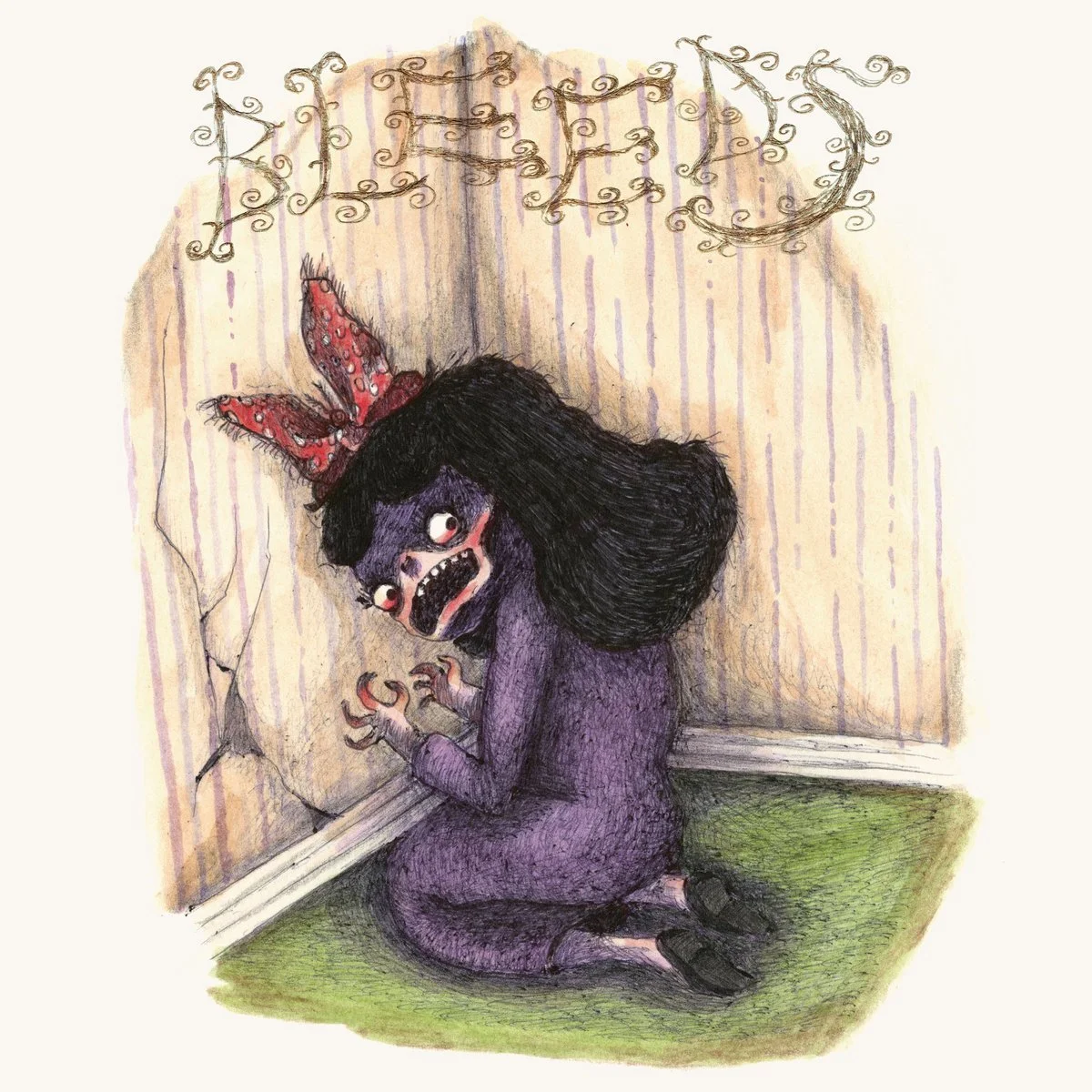by Rohan Press (rohanpress@gmail.com)
That’s the way love goes: it bleeds. “It’s just like swimming through a cold spot in a lake,” frontwoman and songwriter Karly Hartzman reflects: “the sweetest parts of life keep getting bitter every day.” Our ears expect the word “better,” but she gives us the harder and maybe truer word. That tacit slippage between sweetness and bitterness is the heartwood of Wednesday’s newest and most mature record, Bleeds. Every image in Karly’s writing comes back to this taproot: how things that are supposed to heal you can also hurt you. Like chipping your tooth on a cough drop (the opening image of “Pick Up That Knife”), or like how elderberry wine (the title of the absolutely perfect pop song at the record’s center), usually a medicinal, can induce severe nausea if consumed carelessly.
Musically, too, Karly’s most heartbreaking, country-gold melodies coexist with, and bleed into, some of the noisiest, fuzziest, most abrasive moments in the Wednesday catalog, like when she explosively wails the word “died” on “Townies,” transforming a nostalgic waltz into a fierce eulogy for a betraying, lost, but ultimately forgiven high school friend. On Bleeds, Wednesday’s sound is at its most texturally extreme and yet also its most focused: the grief of country music welded to the violence of noise rock; but more than that, it’s the sound of a specific cultural landscape, western North Carolina—its bruises and brashness and beauty.
It’s a place, a culture, a sound, and a community to which Karly’s held on—“I wound up here by holding on,” she insists, in a line borrowed from Evan Gray’s 2023 poetry collection, Thickets Swamped in Fence-Coated Briars. To me, Wednesday has always modeled the difficult path of abiding by the people and places you love, because love is worth it, even when it hurts, and I think there can be no more powerful or important gesture. That doesn’t mean those relationships will last forever, but it does mean that they still have something to teach us, offering us renewed invitations to some kind of gnarled growth and grace. On “Carolina Murder Suicide,” Karly finds compassion even within senseless horror, not by denying grief, but by inhabiting it (“And I wondered if grief could break you in half”); on “Gary’s II,” she reanimates her late landlord’s storytelling voice in a touching and humorous tribute. There’s fear and grief underneath so much of Bleeds, but instead of giving in to it or defying it, Karly finds meaning in living with it. There might well be the screech of abrasion, of a locked brake (“I drove you to the airport with the e-brake on,” she writes in “Elderberry Wine”); there might well be “weeds growing into the springs of the trampoline.” But Karly’s got the wheel, and she’s driving you right through it, because that’s what caring about someone demands.
One of the sweetest friendships in my life just hit a cold spot—my best friend told me he couldn’t receive my love in its full earnestness—and so I know what it means for love to feel so volatile. I’ve been thrown off by it. But I believe love is still worth living by, even when you no longer know how to share it. In the end, Bleeds affirms love, if only by recognizing its complexity. I guess it’s only when you turn to face the pain—when pain and love bleed together—that love can take a deeper turn. And that’s what this record’s about, written, as it was, at the end of Karly’s relationship with guitarist Jake Lenderman. “I’m scared to death,” she admits on the stripped-down “The Way Love Goes,” all guitar and Xandy Chelmis’s cosmic pedal steel. She’s at the threshold, the way she tells it, “Knocking on that screen door / even though I can see right through.” Her reminder to us is to go slow with love, to hesitate, even when you think you know what’s coming. And as she stands there on one side of the door, all her acerbic storytelling about bodies turned up in muddy creeks, about biker gangs, about getting your teeth knocked out, has prepared her to admit something bitter and crushing about herself: “Feel like I’m almost good / enough to know you.” Love lacerates us and yet remains our only lodestar; it makes us feel like we’re not good enough, but also that we’re so close to being good enough. If you’ve been following Wednesday for a while, you’ll know Karly’s told us this story before: How can you live if you can’t love? How can you if you do?

